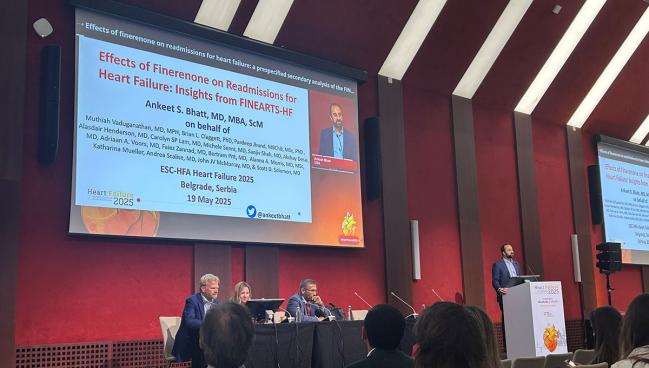Finerenone May Cut Early Readmissions in HF Patients
These exploratory results from the FINEARTS-HF trial require confirmation in dedicated trials. REDEFINE-HF is underway.

BELGRADE, Serbia—Finerenone (Kerendia; Bayer AG) may prevent patients who have heart failure with mildly reduced or preserved ejection fraction (HFmrEF/HFpEF) from returning to the hospital when the nonsteroidal mineralocorticoid receptor antagonist (MRA) is started during or shortly after a hospitalization, an exploratory analysis of FINEARTS-HF suggests.
Rates of HF readmissions, CV readmissions, and HF readmissions/urgent HF visits at 30, 60, and 90 days of follow-up were numerically lower with finerenone than with placebo in this subset of patients, although most of the differences didn’t reach statistical significance, Ankeet Bhatt, MD (Kaiser Permanente San Francisco Medical Center, CA), reported here at the European Society of Cardiology’s Heart Failure 2025 congress.
Treatment in this early phase was generally safe and well tolerated, Bhatt said, noting that the strategy is being put to the test in the ongoing REDEFINE-HF trial, which is adequately powered to detect differences in early readmissions in patients with HFmrEF/HFpEF who are either actively hospitalized for worsening heart failure or have been discharged recently.
“If confirmed in these dedicated trials, implementation of finerenone administered during or shortly after a heart failure hospitalization may favorably modify the trajectory of these patients,” a group that has a substantial risk and heavy economic burden, he said.
The annual cost of HF in the United States is more than $30 billion, a figure that is expected to double by 2030, and these expenditures are largely related to hospitalizations, said Bhatt. The risk of early readmission is high among those recently hospitalized for HF, and these return trips have adverse impacts on prognosis and quality of life.
There is an unmet need for disease-modifying drugs that can influence risk—and reduce readmissions—in this early vulnerable period for patients with HF, irrespective of LVEF, he said.
FINEARTS-HF included 6,001 patients with HFmrEF or HFpEF randomized to finerenone or placebo, with the main results showing that the MRA reduced the risk of cardiovascular mortality or worsening HF events, a benefit driven by a lower risk of HF events.
In this prespecified exploratory analysis, which was published simultaneously online in the Journal of Cardiac Failure, the investigators focused on the subset of 1,005 patients (mean age 71.9 years; 47% women) who were randomized during or within 7 days of a HF hospitalization. At baseline, mean LVEF was 51.5%.
Finerenone-treated patients tended to have lower rates of readmissions and urgent HF visits through the first 90 days of follow-up, although only a few of the differences were statistically significant.
Patients Randomized During or ≤ 7 Days of HF Hospitalization
|
|
Finerenone |
Placebo |
HR (95% CI) |
|
HF Readmissions 30 Days 60 Days 90 Days |
1.8% 3.8% 5.0% |
3.6% 5.6% 7.1% |
0.55 (0.24-1.22) 0.72 (0.40-1.29) 0.71 (0.43-1.19) |
|
HF Readmissions/Urgent HF Visits 30 Days 60 Days 90 Days |
2.0% 3.8% 5.0% |
4.4% 6.3% 8.3% |
0.49 (0.23-1.04) 0.62 (0.35-1.10) 0.60 (0.37-0.99) |
|
CV Readmissions 30 Days 60 Days 90 Days |
3.4% 5.6% 7.4% |
5.4% 8.9% 11.9% |
0.68 (0.37-1.25) 0.65 (0.41-1.05) 0.62 (0.41-0.94) |
There was no indication that finerenone influenced the risk of all-cause readmissions in this early period.
Most safety endpoints did not differ between groups, with overall rates of adverse events and serious adverse events of 44% and 14%, respectively. A serum creatinine level greater than 2.5 mg/dL was seen in 1.3%, with a potassium level above 5.5 mmol/L in 2.9% and below 3.5 mmol/L in 1.8%. Investigator-reported hypotension was significantly more frequent with finerenone (4.2% vs 0.6%; P < 0.001).
Not only will it influence the care of the patients today, I can bet you that this will influence future clinical trial designs as well. Javed Butler
“These are really important results because not only will it influence the care of the patients today, I can bet you that this will influence future clinical trial designs as well,” Javed Butler, MD (Baylor Scott & White Research Institute, Dallas, TX), said during a panel discussion following Bhatt’s presentation.
He questioned how early during a HF hospitalization finerenone could be started.
Bhatt noted that all patients included in FINEARTS-HF were stabilized before randomization. “How early is too early” still needs to be worked out, particularly in randomized trials with largely hospitalized patients, he said. Those trials will provide a “more nuanced understanding of the congestion metrics” at the time finerenone was started. “In addition, we’ll have a better sense of the safety metrics, which I think is important in this population as well,” said Bhatt.
Todd Neale is the Associate News Editor for TCTMD and a Senior Medical Journalist. He got his start in journalism at …
Read Full BioSources
Bhatt AS, Vaduganathan M, Claggett BL, et al. Effects of finerenone on readmissions for heart failure: insights from the FINEARTS-HF trial. J Card Fail. 2025;Epub ahead of print.
Disclosures
- The FINEARTS-HF trial was sponsored by Bayer AG.
- Bhatt reports research grant support to his institution from the National Heart, Lung, and Blood Institute, the National Institute on Aging, the American College of Cardiology Foundation, and the Centers for Disease Control and Prevention, as well as consulting fees from Heart Health Leaders, Sanofi Pasteur, Merck, Amgen, AstraZeneca, and Novo Nordisk.





Comments